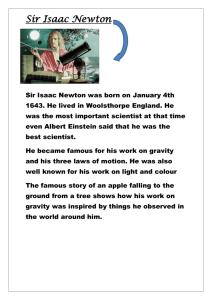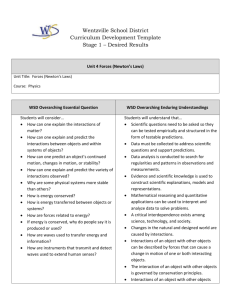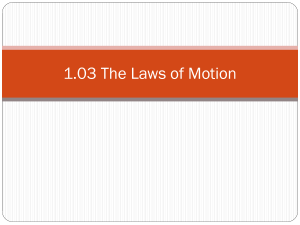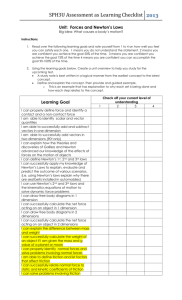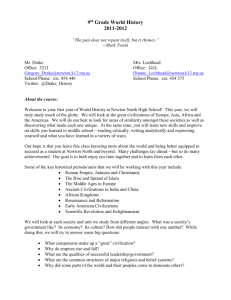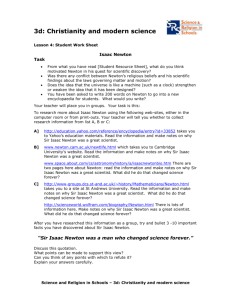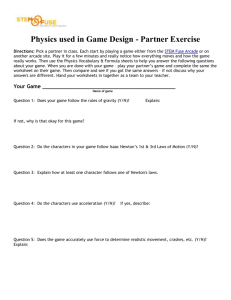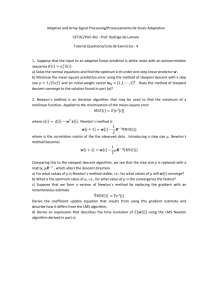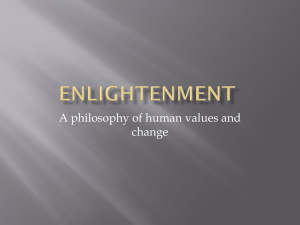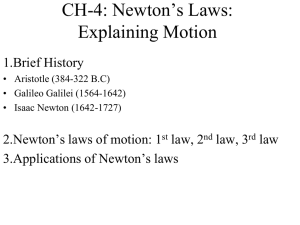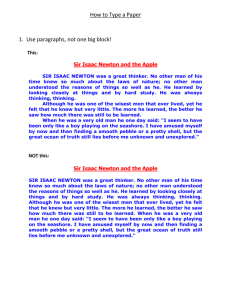Newton`s laws and Famous Scientists Webquest
advertisement
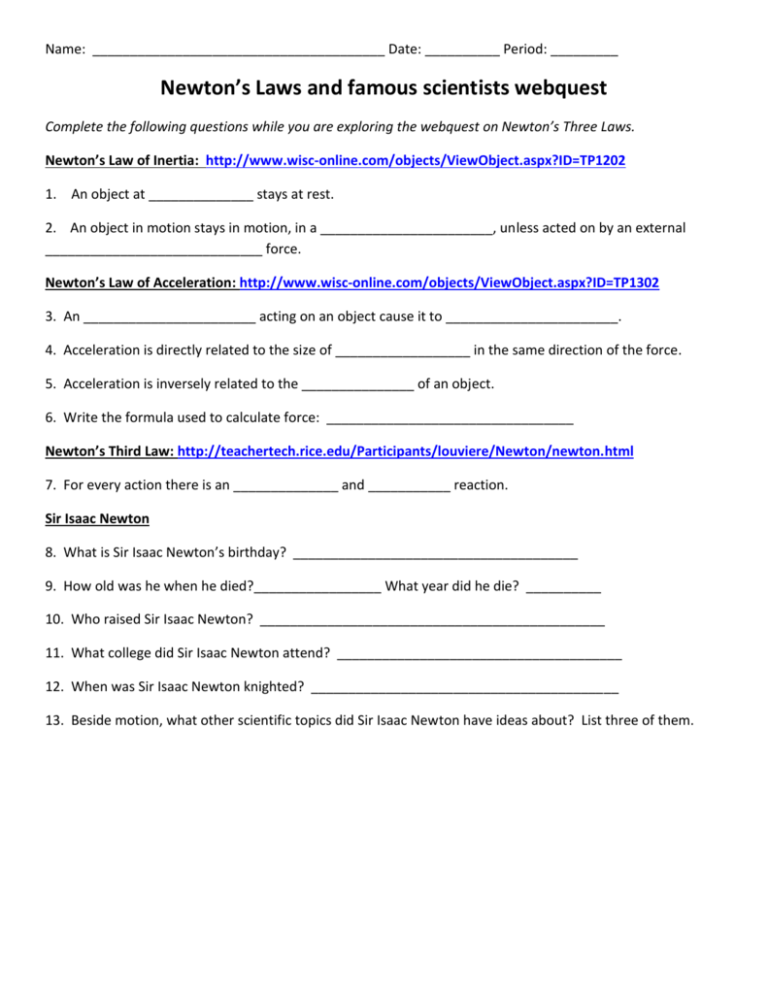
Name: _______________________________________ Date: __________ Period: _________ Newton’s Laws and famous scientists webquest Complete the following questions while you are exploring the webquest on Newton’s Three Laws. Newton’s Law of Inertia: http://www.wisc-online.com/objects/ViewObject.aspx?ID=TP1202 1. An object at ______________ stays at rest. 2. An object in motion stays in motion, in a _______________________, unless acted on by an external _____________________________ force. Newton’s Law of Acceleration: http://www.wisc-online.com/objects/ViewObject.aspx?ID=TP1302 3. An _______________________ acting on an object cause it to _______________________. 4. Acceleration is directly related to the size of __________________ in the same direction of the force. 5. Acceleration is inversely related to the _______________ of an object. 6. Write the formula used to calculate force: _________________________________ Newton’s Third Law: http://teachertech.rice.edu/Participants/louviere/Newton/newton.html 7. For every action there is an ______________ and ___________ reaction. Sir Isaac Newton 8. What is Sir Isaac Newton’s birthday? ______________________________________ 9. How old was he when he died?_________________ What year did he die? __________ 10. Who raised Sir Isaac Newton? ______________________________________________ 11. What college did Sir Isaac Newton attend? ______________________________________ 12. When was Sir Isaac Newton knighted? _________________________________________ 13. Beside motion, what other scientific topics did Sir Isaac Newton have ideas about? List three of them. Bumper Cars http://www.learner.org/interactives/parkphysics/bumpcars.html Directions: When you make your prediction, write down the sentence under the box that you choose. If your prediction is correct, write “same” on the correct answer line. If your prediction is not correct, click the back button on your browser to find the correct answer. Write the sentence on the correct answer line. Collision 1: One Car at Rest Your Prediction: ____________________________________________________ __________________________________________________________________ Correct Answer: ____________________________________________________ __________________________________________________________________ Collision 2: Glancing Collision Your Prediction: ____________________________________________________ __________________________________________________________________ Correct Answer: ____________________________________________________ __________________________________________________________________ Collision 3: Equal Masses Your Prediction: ____________________________________________________ __________________________________________________________________ Correct Answer: ____________________________________________________ __________________________________________________________________ Challenge: On the back create your own scenario for colliding cars. Be sure to include the speed of each car, the mass each car, the mass of each driver, and the angle of impact (straight on, glancing). Create a right and wrong answer and circle the correct answer. Draw your answers. FAMOUS SCIENTISTS Follow the following links. When you arrive at a website, you will have to find that scientist’s name to answer the questions regarding that person. http://www.pbs.org/wgbh/aso/databank/bioindex.html 1. What worried Einstein’s parents?_________________________________________________ 2. Einstein is most well known for what theory? _____________________________________________ 3. Ivan Pavlov is famous for his study of salivation in what animal? ___________________ 4. What is a conditioned reflex? ______________________________________ 5. What 3 famous scientists studied under Rutherford? _________________________ _________________________ ______________________ 6. Crick is famous for a visual model of what? ______________________________ 7. Who worked with Crick to create this model? _____________________ 8. What theory is Wegner know for?______________________________________ 9. Wegner proposed that all continents were once a single land mass called_______________________. http://www.blupete.com/Literature/Biographies/Science/Scients.htm 1. Charles Darwin is known for the theory of ______________________________________. 2. Newton gave us the Laws of ___________________________ and the Law of ___________________. 3. In 1609 Galileo constructed the first astronomical __________________, which he used to discover the four largest satellites of _______________ and the stellar composition of the Milky Way. 4. Kepler’s "Third Law" for which he is most known, "the square of a planet's periodic _______________ is proportional to the cube of its mean distance from the _____________." 5. During the war years, Robert Oppenheimer was chosen to head up the American effort to bring into being an earth bound _________________ explosion. 6. Pascal was credited with the invention of the _________________ and certain mathematical formulations which "heralded the invention of the differential _______________." 7. Crick and Watson made their big discovery, that DNA was a winding __________________ in which pairs of bases held the strands together. This model of the DNA double helix formed the basis of important research in the areas of _________________ and Molecular _________________. 8. Wöhler's work led to him isolating _________________. "His synthesis of urea from ammonium cyanate in 1828 revolutionized ______________ chemistry." http://www.astr.ua.edu/4000WS/summary.shtml 1. Marie Curie is famous for her work on _______________. In fact, she and her husband, Pierre, first coined that word. She won the Nobel prize twice, first in 1903 (jointly with her husband, and with Henri Becquerel) for the discovery of ________________ and ________________, and again (by herself) in 1911 for the isolation of pure radium. 2. Ruth Benedict wrote of the differences between the cultures around the world and talked about different patterns related to culture and behavior and wrote four books. She helped to shape ____________________ not only for the United States but also the world. 3. In 1860 for her contribution to Army statistics and comparative hospital statistics Florence Nightingale became the first woman to be elected a fellow of the Statistical Society. Her writings on hospital planning and organization had a profound effect in England and across the world. She was the first person in the Western world to introduce ____________ into public health. She also introduced the ______________ chart so useful in making presentations! 4. Janet Taylor wrote several texts on ___________________ and nautical astronomy and was the only female ______________ maker in London. She built a beautiful ____________ for the Prince of Wales. 5. Nettie Stevens was a ______________. She is the discoverer of the __________________ determination of sex (those X and Y chromosomes that determine whether the baby is a boy or girl). 6. Manning was the inventor of a ___________ and ____________________. 7. In 1859 Lefebre received the patent for the process used to produce __________________. 8. Mary Brush received a US patent for a __________________ in 1815. This was one of the early United States __________________ awarded to a woman.
